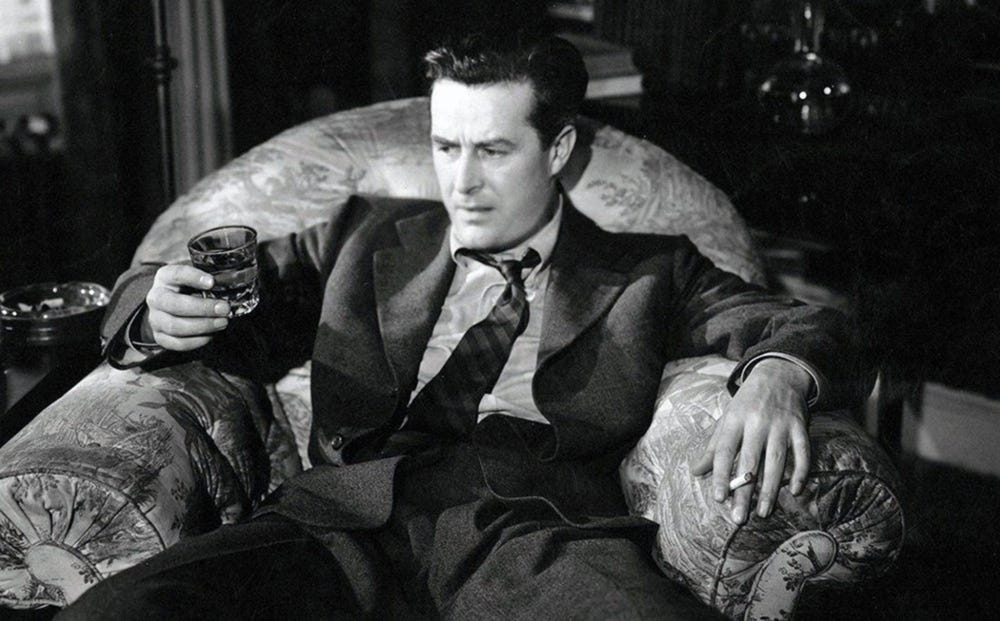The Lost Weekend (1945), winner of four Acadamy awards (Best Picture, Best Director, Best Adapted Screenplay, and Best Actor for Ray Milland), opens with Don (Milland) and his brother, Wick (Philip Terry), packing for a getaway weekend in the country. Don peers out his window at the bottle of whiskey he’s tied and left hanging so no one can find it. Don is irritable and looking for any reason to get away from his brother, even for a few minutes so that he can be alone with the bottle. His girlfriend, Helen (Jane Wyman), stops by to say hello before she goes to see the symphony. Don has a great idea: Why doesn’t Wick go with her? After all, Don just needs a few hours to put himself together before their weekend. He angrily insists. Wick and Helen reluctantly acquiesce. Wick is on to him.
It’s difficult to watch The Lost Weekend at times. Director Billy Wilder and lead Ray Milland put together an unflinching portrait of the jubilant highs and treacherous lows of drinking. It’s easily recognizable even from the lens of 2023. Throughout the film, Don refers to a novel that he’s working on, no doubt to impart to anyone willing to listen that he’s got important business going on. (He hasn’t started it yet, but he’s definitely going to.) It’s a perfect device to communicate to non-addictive and addictive personalities alike, a common consequence of substance abuse: it makes one reach for the stars, theoretically and temporarily. Unfortunately, substance abuse is excellent for setting ambitious goals, but the follow-through usually comes “later.” Another incredible sequence, reminiscent of a dreamlike style made famous by show-stoppers Powell and Pressburger, shows our tragic protagonist at the opera, doing his best to focus on the singers. We understand that he hasn’t had a drink for several hours. The singing figures morph into floating overcoats. In the center, he can see the bulging pocket of his own overcoat, filled with the liquid gold he craves but stowed and deposited at the coat check.
A dramatic string ensemble provides a score that can be accurately described as “spooky” when a lead theremin drifts in and out to punctuate Don’s highs and lows. The film takes its time to show us the slow motion of Don’s fall from the wagon. As if we’re watching gravity, in slow motion, drag him toward the earth. The film humanizes him in ways unseen in practically any other film depicting alcoholism. Don is given space to tell his story sympathetically, and a virtuoso performance from Ray Milland does just that. (He deserved the Oscar.) But, like watching a loved one struggle with a problem that spills into your life in unwelcome and unexpected ways, we can only sympathize from a distance.
The Lost Weekend is a Hollywood studio film so raw that it would feel at home in a line-up of hand-held, street-shot French new-wave films. Up until it ends, that is. Without spoiling anything, I will say that the ending simply doesn’t work. The film was driving hard down the road of realism but took a last exit into Hollywood. Despite this, the movie is yet another testament to Billy Wilder’s mastery of tone. His films show incredible variance, from straight comedy in movies like Some Like it Hot (1959) to romantic comedy in The Apartment (1960) to procedural thriller in Witness for the Prosecution (1957) to the suspense-drama bordering on horror in this film.
A notable Thoreau quote is uttered by Don at one point in the film: “The mass of men lead lives of quiet desperation.” It seems as if sympathy is being implied for someone who considers drinking to be the antidote to life’s travails. It feels like Wilder’s weakest attempt to get into the mind of an addict. Noble the quote may be, the sad truth is much simpler: being high feels good. A much more accurate representation might be, as Ray says when lauding alcohol: “Maybe it shrinks my liver. Maybe it pickles my kidneys. But what it does to my mind!”
-J.M.
Waking up on time, no headache
Substance abuse and chemical dependency are a big deal. If you might need help: please get help.
That aside, let’s all pause and take a look at our own vices and maladaptive behaviors - you have at least one. (Yes, you do.) Nail biting, doomscrolling TikTok, excessive masturbation, binge eating, mentally arguing with the uncaringly static words of some stranger on the internet. (Got ‘em.) Whatever it is, if it’s getting in the way of your relationships and other activities you enjoy, it’s time to think about an alternative.
It’s really hard to just stop doing something we know is bad - look at how many users Twitter still has. Instead, we can try to replace harmful behaviors with more helpful ones. Things like eating fruit instead of candy, or deleting our Twitter account to show that we don’t truck with alt-right apologists and emotionally stunted oligarchs. Baby steps - be kind to yourself.
This week we’re substituting alcohol with “no alcohol.” But you can still have something fun to sip on, as a treat. Alcohol does a lot of things in a drink - there’s the sting and bite of it, the heat it leaves in your throat, the subtle depth of flavor that changes how we perceive other flavors in the drink. That all makes it very difficult to make a traditional cocktail sans alcohol - so we’re not going to.
Many “mocktails” are overly sweet from fruit juice. Others rely on the Quinine in tonic water to produce a bitter hit. For this drink, we’re going to slide away from both of those well-trodden paths and look for tannins like those in wine and aged whisky, as well as the spice and heat from spirit-forward drinks. For tannins, we’ll look to extra strong black tea and cranberry. We’ll borrow some sting from capsaicin and gingerol, both compounds that activate the same pain receptors alcohol tickles on your tongue.
Ingredients
2 oz No Alcohol. You can substitute Nothing if you don’t have No Alcohol handy.
1 1/4 oz Double Strength Black Tea1
3/4 oz Cranberry Ginger Reduction2
3/4 oz Fresh Squeezed Lemon Juice
1 Heaped Bar Spoon Hot Honey (like Nugget Honey, not honey that’s been warmed up.)
1 Bar Spoon Agave Nectar or Rich Demerara Simple Syrup
4 Basil Leaves
Preparation
Prepare double-strength black tea and cranberry ginger reduction. It’s going to make enough for more than one drink, so make some for your friends. Or go wild and drink it all.
Add lemon juice and basil to a mixing glass and gently muddle
Add remaining ingredients to mixing glass
Add ice and stir until the outside of the mixing glass feels cold
Strain into a rocks glass over a large cube
Garnish with a twist of lemon and basil leaf
-E.D.
The Lost Weekend
Written by Billy Wilder and Charles Brackett; Directed by Billy Wilder
1945
101 minutes
English
It’s tea. You know - Tea. Hot water. This has half the water. You want it really strong and tannic.
Add ½ Cup Sliced Fresh Ginger to 1 Cup Unsweetened Cranberry Juice. Bring to a boil and simmer until slightly reduced.





Booooo! The only thing worse than a blackout drunk is a teetotaler!